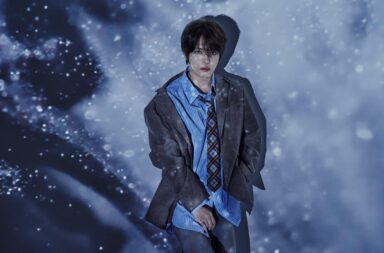
GFriend have had a pretty busy year. With the acquisition of label company Source Music in mid-2019 came an increased participation in production, a trial of bold new concepts, and most obviously, a shift in the group’s style and sound.
GFriend’s album series 回 (or “hui,” a Chinese-Korean word meaning “to spin”), their first undertaking under parent company Big Hit, showcased both the strengths of their traditional sweeter side and the inventiveness and variety they’re actually capable of. Capping off this era is 回: Walpurgis Night, a seeming culmination of all the fears, doubts, celebrations, and reassurances the group has had over their massive year of change.
Their conflicting feelings are evident in the album’s meandering structure, which vaguely follows the itinerary of a group of friends’ night out. But what easily could’ve been an aimless mess is saved by the group’s confident, creative, and self-aware delivery.
The night is aptly kicked off with “MAGO,” an empowering anthem about finally and unapologetically tuning in to one’s self. In a year that leaned heavily on retro, “MAGO” stands out as quintessential disco, from the rich layer of synths and harmonies to the imagery it evokes about breaking free from a stuffy atmosphere. Though for all its talk of release and defiance, it would have done well to add just a bit more oomph by way of a dramatic string section or even just more use of vocalist Yuju’s piercing high note.
From the get-go, the group already hints at their general ambivalence towards their ongoing reinvention. After a series of self-assured refrains, they divulge in the second verse:
I am the light and the darkness
Lies or truth, I can be both
Whatever I choose, so it’ll be
Joy and sorrow
All this will bе me
Lyrically, things only get more contradictory from there. While “GRWM”—a sweet and safe number that may as well come from their early albums—further celebrates their transformation (“More special than anything else, I’d like to show you my changed self”), “Three of Cups” revels in the past (“Some things don’t ever change, change, change”) and betrays the strain beneath all their cries of positivity (“Right at this moment, on this good day, don’t you dare cry”).
“Love Spell,” a seductive, soft rock number that’s easily one of this record’s best isn’t existential in the way the previous songs are, but it’s just as self-reflective. Here they come to a realization that there is no shortcut to love (or success for that matter). “Relay this message to the pathetic me back then,” they sing in the first chorus. But after a few more verses, they flip it and proclaim, “Relay this message to the proud me now.”
Despite their mixed messages (are they onboard with all this change or not?), the first tracks of the album are equally upbeat and inviting. They’re shiny and polished, if not a bit wanting of the roguish texture sampled in “Love Spell.” Like a trusty disco ball, they swing and shine but never crash as they almost certainly would in an actual rager.
This is followed by arguably the highlight of the album—the subunit songs, another first for GFriend. If the initial part attempted to simulate the mania of a rave, the following duets capture the girls’ vulnerability as the party wanes and the hype falters. This is the part of the evening where you shake off the glitter in your eyes and take a good, hard look at yourself in the club’s dimly lit bathroom mirror.
The doubt that was merely hinted at is fully confronted now, and nowhere is this more obvious than in the lo-fi masterpiece “Night Drive.” Eunha begins by wondering:
Did I come far? The road that seemed far away
Sometimes I didn’t feel like I was myself and couldn’t breathe
Past days and the wind try to wrap around and comfort me
And immediately, Yuju rebuts with the chorus, “Don’t you worry…even if everything about you is gone, don’t let go of this moment.” This is followed by a litany of reassurances, backed by a minimalist and reverberating synth that highlights the duo’s impressively subdued yet dynamic vocal range. If some of the songs were missing any soul, it probably all went to this ballad that is equal parts stirring and soothing.
Speaking of lacking soul, Yerin and SinB’s “Secret Diary” feels like the sweeter flip side of “Night Drive.” Apart from the nice blend of SinB’s round voice and Yerin’s syrupy vocals, which effectively underscores the conversation between them, the song is nothing more than cute, predictable fare.
The real surprise here is “Better Me,” Sowon and Umji’s sultry take on Latin pop. If the other duets were ambiguous about their stance on change, “Better Me” is a clear call for it. “Find your lost self, find it now,” they sing in the chorus. “The color, the scent, I like me better now.” And as if this sudden shift in tone and message wasn’t enough, the track also blesses us with the return of GFriend’s delightful (and criminally underutilized) rap chops.
As the eventful night comes to a close, we’re hit with “Wheel of the Year,” the last of the new songs (“Apple,” “Crossroads” and “Labyrinth” from the previous 回 albums are also present in Walpurgis Night). With its sweeping orchestration and rousing melody, it sounds exactly like the kind of number you’d bookend a wild evening (or album or year) with. Despite its climactic tone, “Wheel of the Year” doesn’t resolve any of the conflicting feelings expressed in the previous songs. It does however make clear their goal moving forward: GFriend will simply follow their hearts, wherever that may lead. “Trust your heart’s compass, the end is not fixed,” they sing, “Let’s continue going.”
What is impressive about this otherwise standard track is that it’s a clever call back to “Compass,” a b-side from their 2016 debut album LOL. Both songs share the same melody and references, but while “Compass” is hopeful and saccharine, “Wheel of the Year” is contemplative and gritty (leaving in the band’s last-minute strums and fumbles in the final mix was a nice touch). It is, in other words, more grown-up.
Because as inconsistent as GFriend are in their latest album, both in message and genre, there is an unwitting charm and maturity in their awareness of this, from the constant references to their past work to the admission of their own uncertainty. This is also buoyed by their excitement in trying all these different styles out. They’re having a blast despite the growing pains, and it comes across in the way they’ve chosen to tell their never-ending story at the backdrop of a glittery night.
Ultimately, Walpurgis Night is a fun and poignant record, the perfect accompaniment to a wild, after-party drive that’s full of conviction and promise despite having absolutely no direction, much less a final destination.
(Naver [1][2]. YouTube [1][2][3][4][5][6]. Lyrics via Color Coded Lyrics. Images via Source Music and Big Hit Labels)


